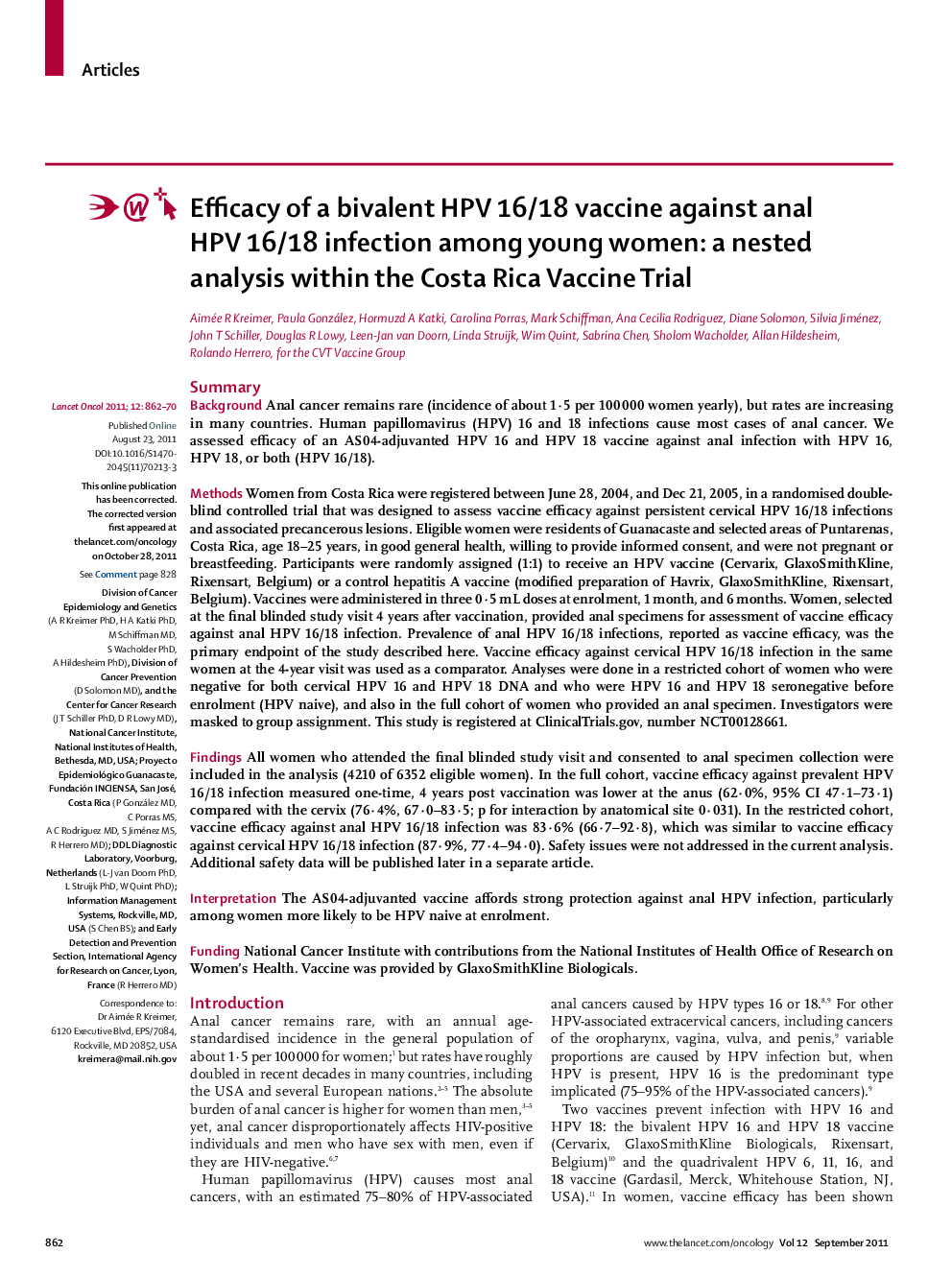| Article ID | Journal | Published Year | Pages | File Type |
|---|---|---|---|---|
| 3994563 | The Lancet Oncology | 2011 | 9 Pages |
SummaryBackgroundAnal cancer remains rare (incidence of about 1·5 per 100 000 women yearly), but rates are increasing in many countries. Human papillomavirus (HPV) 16 and 18 infections cause most cases of anal cancer. We assessed efficacy of an AS04-adjuvanted HPV 16 and HPV 18 vaccine against anal infection with HPV 16, HPV 18, or both (HPV 16/18).MethodsWomen from Costa Rica were registered between June 28, 2004, and Dec 21, 2005, in a randomised double-blind controlled trial that was designed to assess vaccine efficacy against persistent cervical HPV 16/18 infections and associated precancerous lesions. Eligible women were residents of Guanacaste and selected areas of Puntarenas, Costa Rica, age 18–25 years, in good general health, willing to provide informed consent, and were not pregnant or breastfeeding. Participants were randomly assigned (1:1) to receive an HPV vaccine (Cervarix, GlaxoSmithKline, Rixensart, Belgium) or a control hepatitis A vaccine (modified preparation of Havrix, GlaxoSmithKline, Rixensart, Belgium). Vaccines were administered in three 0·5 mL doses at enrolment, 1 month, and 6 months. Women, selected at the final blinded study visit 4 years after vaccination, provided anal specimens for assessment of vaccine efficacy against anal HPV 16/18 infection. Prevalence of anal HPV 16/18 infections, reported as vaccine efficacy, was the primary endpoint of the study described here. Vaccine efficacy against cervical HPV 16/18 infection in the same women at the 4-year visit was used as a comparator. Analyses were done in a restricted cohort of women who were negative for both cervical HPV 16 and HPV 18 DNA and who were HPV 16 and HPV 18 seronegative before enrolment (HPV naive), and also in the full cohort of women who provided an anal specimen. Investigators were masked to group assignment. This study is registered at ClinicalTrials.gov, number NCT00128661.FindingsAll women who attended the final blinded study visit and consented to anal specimen collection were included in the analysis (4210 of 6352 eligible women). In the full cohort, vaccine efficacy against prevalent HPV 16/18 infection measured one-time, 4 years post vaccination was lower at the anus (62·0%, 95% CI 47·1–73·1) compared with the cervix (76·4%, 67·0–83·5; p for interaction by anatomical site 0·031). In the restricted cohort, vaccine efficacy against anal HPV 16/18 infection was 83·6% (66·7–92·8), which was similar to vaccine efficacy against cervical HPV 16/18 infection (87·9%, 77·4–94·0). Safety issues were not addressed in the current analysis. Additional safety data will be published later in a separate article.InterpretationThe AS04-adjuvanted vaccine affords strong protection against anal HPV infection, particularly among women more likely to be HPV naive at enrolment.FundingNational Cancer Institute with contributions from the National Institutes of Health Office of Research on Women's Health. Vaccine was provided by GlaxoSmithKline Biologicals.
